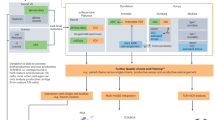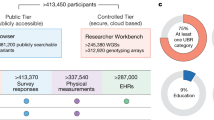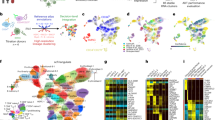Abstract
HLA-A*02 is the most prevalent and polymorphic major histocompatibility complex (MHC) allele family in humans. Functional differences have been revealed among subtypes, demanding further subtyping of HLA-A*02 in basic and clinical settings. However, the fast growing polymorphisms render traditional primer- or probe-based typing methods impractical and result in increasing ambiguities in direct sequence-based typing. In this study, we combined group-specific amplification and mono-allelic sequencing to design and validate a simple scheme for the complete screening and accurate subtyping of all 540 reported HLA-A*02 alleles. This scheme could be performed in routine labs to facilitate studies with an interest in HLA-A*02.
This is a preview of subscription content, access via your institution
Access options
Subscribe to this journal
Receive 12 digital issues and online access to articles
$119.00 per year
only $9.92 per issue
Buy this article
- Purchase on Springer Link
- Instant access to full article PDF
Prices may be subject to local taxes which are calculated during checkout


Similar content being viewed by others
References
Imanishi T, Akaza T, Kimura A, Tokunaga K, Gojobori T . Allele and haplotype frequencies for HLA and complement loci in various ethnic groups. In: Tsuji K, Aizawa M, Sasazuki T (ed.) HLA 1991: Proceedings of the Eleventh International Histocompatibility Workshop and Conference. Oxford: Oxford University Press, 1992: 1065–1220.
Robinson J, Halliwell JA, McWilliam H, Lopez R, Parham P, Marsh SG . The IMGT/HLA database. Nucleic Acids Res 2013; 41: D1222–D1227.
Barouch D, Friede T, Stevanovic S, Tussey L, Smith K, Rowland-Jones S et al. HLA-A2 subtypes are functionally distinct in peptide binding and presentation. J Exp Med 1995; 182: 1847–1856.
Sudo T, Kamikawaji N, Kimura A, Date Y, Savoie CJ, Nakashima H et al. Differences in MHC class I self peptide repertoires among HLA-A2 subtypes. J Immunol 1995; 155: 4749–4756.
Liu J, Chen KY, Ren EC . Structural insights into the binding of hepatitis B virus core peptide to HLA-A2 alleles: towards designing better vaccines. Eur J Immunol 2011; 41: 2097–2106.
Vejbaesya S, Eiermann TH, Suthipinititharm P, Bancha C, Stephens HA, Luangtrakool K et al. Serological and molecular analysis of HLA class I and II alleles in Thai patients with psoriasis vulgaris. Tissue Antigens 1998; 52: 389–392.
Chen KY, Liu J, Ren EC . Structural and functional distinctiveness of HLA-A2 allelic variants. Immunol Res 2012; 53: 182–190.
Dunckley H . HLA typing by SSO and SSP methods. Methods Mol Biol 2012; 882: 9–25.
Erlich H . HLA DNA typing: past, present, and future. Tissue Antigens 2012; 80: 1–11.
Erlich RL, Jia X, Anderson S, Banks E, Gao X, Carrington M et al. Next-generation sequencing for HLA typing of class I loci. BMC Genomics 2011; 12: 42.
Krausa P, Browning MJ . A comprehensive PCR-SSP typing system for identification of HLA-A locus alleles. Tissue Antigens 1996; 47: 237–244.
Gatz SA, Pohla H, Schendel DJ . A PCR-SSP method to specifically select HLA-A*0201 individuals for immunotherapeutic studies. Tissue Antigens 2000; 55: 532–547.
Liang B, Zhu L, Liang Z, Weng X, Lu X, Zhang C et al. A simplified PCR-SSP method for HLA-A2 subtype in a population of Wuhan, China. Cell Mol Immunol 2006; 3: 453–458.
Williams F, Middleton D, Savage D, Gorodezky C, Wilson DW, Fitzgerald JM et al. Development of PCR-SSOP for the identification of HLA-A*02 subtypes and determination of HLA-A*02 frequencies within different ethnic populations. Tissue Antigens 1997; 49: 129–133.
Dalva K, Beksac M . HLA typing with sequence-specific oligonucleotide primed PCR (PCR-SSO) and use of the Luminex technology. Methods Mol Med 2007; 134: 61–69.
Fleischhauer K, Zino E, Mazzi B, Severini GM, Benazzi E, Bordignon C . HLA-A*02 subtype distribution in Caucasians from northern Italy: identification of A*0220. Tissue Antigens 1996; 48: 673–679.
Selvakumar A, Granja CB, Salazar M, Alosco SM, Yunis EJ, Dupont B . A novel subtype of A2 (A*0217) isolated from the South American Indian B-cell line AMALA. Tissue Antigens 1995; 45: 343–347.
Fischer GF, Fae I, Frey E, Mayr WR . HLA-A*02172* adds to the heterogeneity of HLA-A*02 alleles. Tissue Antigens 1998; 51: 312–314.
Browning MJ, Madrigal JA, Krausa P, Kowalski H, Allsopp CE, Little AM et al. The HLA-A,B,C genotype of the class I negative cell line Daudi reveals novel HLA-A and -B alleles. Tissue Antigens 1995; 45: 177–187.
Krausa P, Barouch D, Bodmer JG, Browning MJ . Rapid characterization of HLA class I alleles by gene mapping using ARMS PCR. Eur J Immunogenet 1995; 22: 283–287.
Krausa P, Barouch D, Bodmer JG, Hill AV, Mason C, McMichael AJ et al. Characterization of a novel HLA-A2 variant, A*0214, by ARMS-PCR and DNA sequencing. Immunogenetics 1995; 41: 50.
Krausa P, Brywka M 3rd, Savage D, Hui KM, Bunce M, Ngai JL et al. Genetic polymorphism within HLA-A*02: significant allelic variation revealed in different populations. Tissue Antigens 1995; 45: 223–231.
Dunn PP, Cox ST, Little AM . Sequencing protocols for detection of HLA class I polymorphism. Methods Mol Biol 2003; 210: 191–222.
Cereb N, Maye P, Lee S, Kong Y, Yang SY . Locus-specific amplification of HLA class I genes from genomic DNA: locus-specific sequences in the first and third introns of HLA-A, -B, and -C alleles. Tissue Antigens 1995; 45: 1–11.
Kotsch K, Wehling J, Kohler S, Blasczyk R . Sequencing of HLA class I genes based on the conserved diversity of the noncoding regions: sequencing-based typing of the HLA-A gene. Tissue Antigens 1997; 50: 178–191.
Acknowledgements
The authors would like to thank Jueqin Yang for assistance with sample preparation. The authors would also like to thank the Fred Hutchinson Cancer Research Center IHWG Cell and Gene Bank for providing reference genomic DNA samples. This work was supported through grants from the National Natural Science Foundation of China (NSF-30830093) and the National Key Program (973) for Basic Research of China (2009CB522409) to HJ.
Author information
Authors and Affiliations
Corresponding author
Additional information
Supplementary Information accompanies the paper on Cellular & Molecular Immunology website.
Supplementary information
Rights and permissions
About this article
Cite this article
Song, S., Han, M., Zhang, H. et al. Full screening and accurate subtyping of HLA-A*02 alleles through group-specific amplification and mono-allelic sequencing. Cell Mol Immunol 10, 490–496 (2013). https://doi.org/10.1038/cmi.2013.33
Received:
Accepted:
Published:
Issue Date:
DOI: https://doi.org/10.1038/cmi.2013.33
Keywords
This article is cited by
-
Nanoliposomal VEGF-R2 peptide vaccine acts as an effective therapeutic vaccine in a murine B16F10 model of melanoma
Cancer Nanotechnology (2023)
-
T-cell receptor-based therapy: an innovative therapeutic approach for solid tumors
Journal of Hematology & Oncology (2021)
-
HLA-A and -B Type and Haplotype Frequencies in IgG Subclass Deficiency Subgroups
Archivum Immunologiae et Therapiae Experimentalis (2020)
-
The shared frameshift mutation landscape of microsatellite-unstable cancers suggests immunoediting during tumor evolution
Nature Communications (2020)



